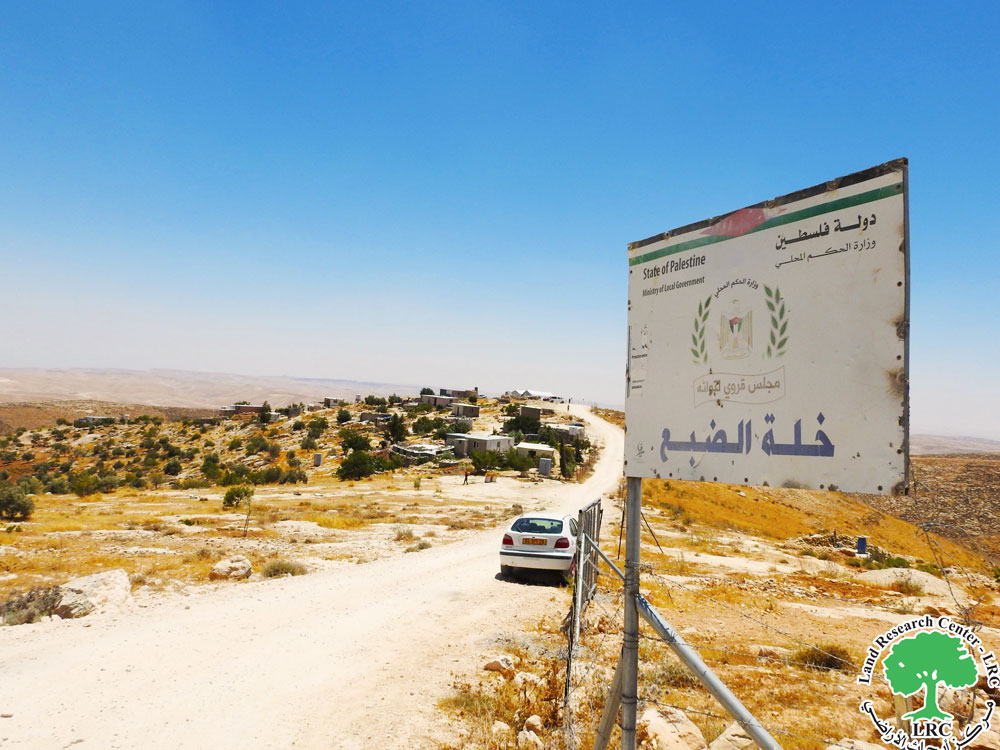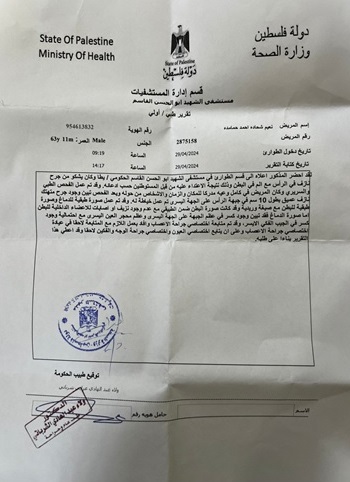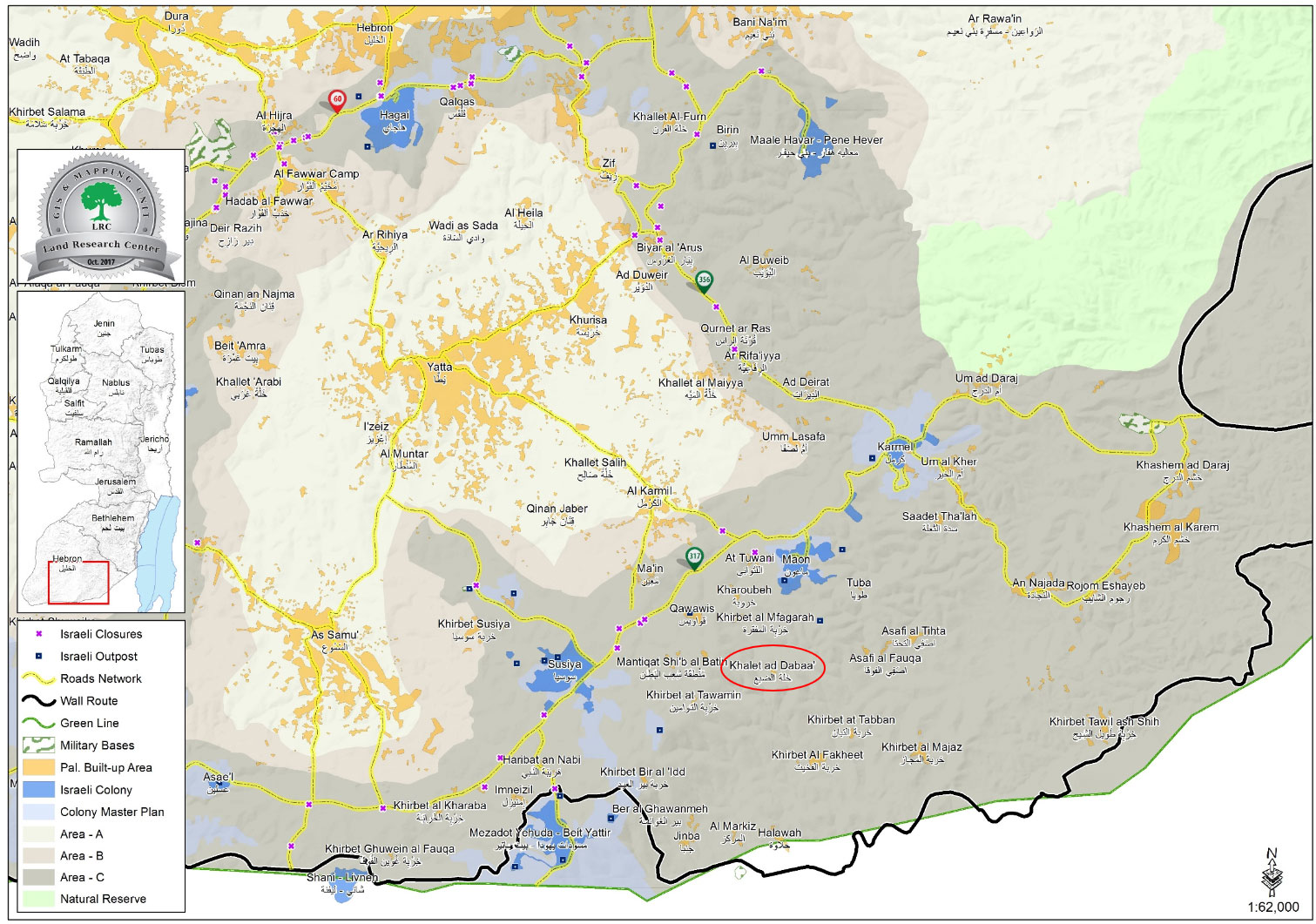Illegal colonists attack a farmer and his land in Khallat Ad-Dabe'a / Masafer Yatta / south Hebron
Violation: Overgrazing on cultivated land and physical assault on the landowner.
Date of Violation: April 29, 2024.
Location: Khillet al-Dabe', Yatta town, Hebron Governorate.
Perpetrators: Settler herdsmen.
Affected Party: Farmer Naim Hamamdeh.
Description:
The farmer Naeem Shehadeh Ahmad Hamamdeh faced attacks by settler herders, including severe physical assault, encroachment on his farmland, overgrazing by their livestock, and crop damage.
Farmer Hamamdeh, aged 65, resides in the village of Al-Mufaqara in Masafer Yatta, south of Hebron. He works in farming and livestock raising, which are his family's sole source of income and his only livelihood. He supports a family of four members and owns a herd of approximately 50 sheep. He also leases farmland from residents and members of his tribe in his village, renting about 100 dunams near the village of Khirbet al-Daba' (one of the Masafer Yatta villages, located 3 km from Al-Mufaqara). Some of this land consists of natural pastures, while the majority is cultivated with winter crops to feed his livestock and for grazing after harvest.
Near these villages lie the settlement of "Ma'on" and another grazing settler outpost. Settlers residing in this outpost graze their livestock on privately owned Palestinian lands and crops and repeatedly assault farmer Hamamdeh in attempts to seize his land and crops.
Hamamdeh shared with a researcher from the Land Research Center the following account:
"In mid-March 2024, I took my flock of sheep to graze on my land east of the village. I found two settlers, dressed in military attire, who had brought their sheep onto my land. I tried to chase them away, but they shouted at me. One of them demanded that I leave the area. Fearing for my life, I retreated and called the Israeli police to file a complaint. A police patrol arrived, asked for my personal details, and inquired about the incident. They then spoke with the settlers and instructed them to leave my land. However, about three days later, I received a call from the Israeli police, requesting me to visit their station near the settlement of 'Kiryat Arba.' Upon arrival, I discovered that one of the settlers had filed a complaint against me, falsely alleging that I had assaulted him. I denied the accusation, as no such incident occurred. I was released after signing a financial guarantee."
Hamamdeh continued:
"On April 29, 2024, around 7:30 AM, I went to graze my sheep on my land. I saw two settlers wearing masks wandering on my land. One of them carried a wooden stick. He approached me and struck me on the head with the stick, then sprayed pepper spray in my face. I fell to the ground, unable to see, and felt blood streaming down my head. About 10 minutes later, a farmer in the area came to my aid, helped me leave the site, and called an ambulance. The ambulance arrived near Khirbet al-Daba' and provided me with first aid before transferring me to a hospital in Yatta. Doctors stitched my wound, conducted necessary tests, and discharged me, advising me to return for a follow-up in a week."
Medical Report on Farmer Hamamdeh's Injury
Overgrazing in Palestinian Agricultural Lands: An Israeli Occupation Environmental Violation
Overgrazing of cultivated lands can lead to soil erosion and degradation. It also reduces biodiversity and productivity, contributing to desertification. The continuous trampling by animals destroys vegetation and kills new plant growth, accelerating soil erosion and agricultural land deterioration. In areas like Khirbet al-Daba', the damage is severe, perpetuating desertification and causing significant environmental harm.
Khirbet al-Daba'
Khirbet al-Daba' is located east of the town of Yatta and is one of the Masafer Yatta communities. It has a population of about 100 residents who rely on farming, livestock raising, and dairy production. The village is managed by the Masafer Yatta Village Council, which oversees the surrounding communities affiliated with Yatta. The village is connected to Yatta by a rugged dirt road, similar to other Masafer Yatta communities. Most houses in the village are built with bricks and roofed with corrugated metal sheets, and the village lacks any service institutions.
Legal Commentary
The Palestinian environment is subjected to numerous environmental violations by the Israeli occupation, which blatantly disregards all international and national laws and norms related to environmental rights. The right to live in a clean and healthy environment is an inherent human right. The occupation often attempts to appear concerned about international environmental issues despite having signed major environmental protection agreements, including the Basel Convention (1989), the Rotterdam Convention (2008), the Stockholm Convention (2001), and the Ramsar Convention (1971), as well as various air quality and climate treaties. However, it continues to violate these agreements without accountability or oversight.
In addition to international texts guaranteeing the right to a clean and safe environment for those under military occupation, such as the International Covenant on Economic, Social, and Cultural Rights (1966) adopted by the UN General Assembly in Resolution 2200 A (d-21) on December 16, 1966, Article 1, Clause 2 states:
"All peoples may, for their own ends, freely dispose of their natural wealth and resources without prejudice to any obligations arising out of international economic cooperation, based upon the principle of mutual benefit, and international law. In no case may a people be deprived of its own means of subsistence."
Undoubtedly, the Israeli side's violations contravene the laws of the "occupying state" itself, let alone other laws. In the context of this case, the Israeli Penal Law of 1977, as amended, stipulates that trespassing on someone else's property with the intent to commit a crime or intimidate the property owner is a punishable offense. Article 447 states:
"Anyone who, with the intent to intimidate, insult, harass, or commit a crime, shall be imprisoned for two years:
(1) Enters or crosses onto another's property;
(2) After lawfully entering the property, unlawfully remains there.
(b) If the offender carries a firearm or weapon during the commission of the offense, the penalty shall be four years' imprisonment."
This article criminalizes unauthorized entry into someone else's property with the intent to intimidate or harass, imposing a two-year sentence, which doubles if the violator carries a weapon or commits a crime, including overgrazing. This explicit criminalization highlights the violation of even the internal laws of the occupying state.
Therefore, the Israeli assailant has no legal justification for breaching international agreements and internal laws. The Israeli judiciary should hold settlers accountable for these actions under its legal texts. However, no legal accountability exists for the offenders under the Israeli judicial system. Nevertheless, every individual has the right to live in a clean, safe, and secure environment free from violations and aggression.
مشروع: حماية الحقوق البيئية الفلسطينية في مناطق "ج" SPERAC IV - GFFO
Disclaimer: The views and opinions expressed in this report are those of Land Research Center and do not necessarily reflect the views or positions of the project donor; the Norwegian Refugee Council.
إخلاء المسؤولية: الآراء ووجهات النظر الواردة في هذا التقرير هي آراء ووجهات نظر مركز أبحاث الأراضي ولا تعكس بالضرورة وجهات نظر أو مواقف الجهة المانحة للمشروع؛ المجلس النرويجي. للاجئين



